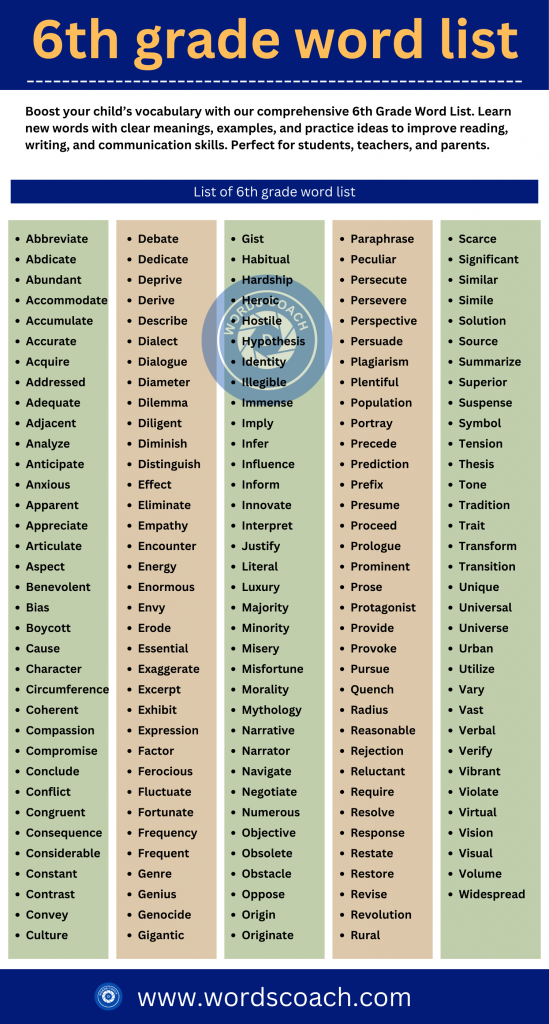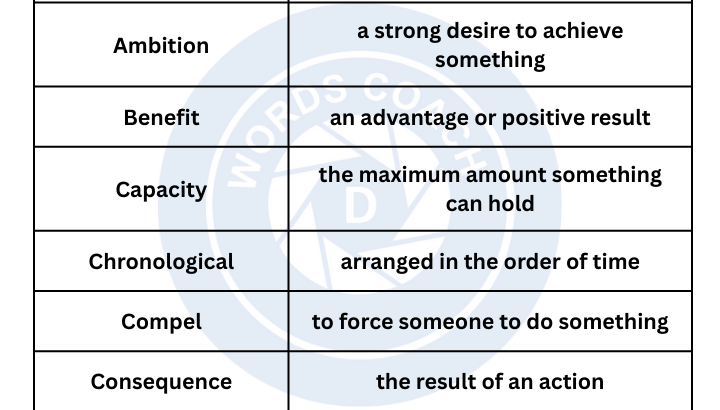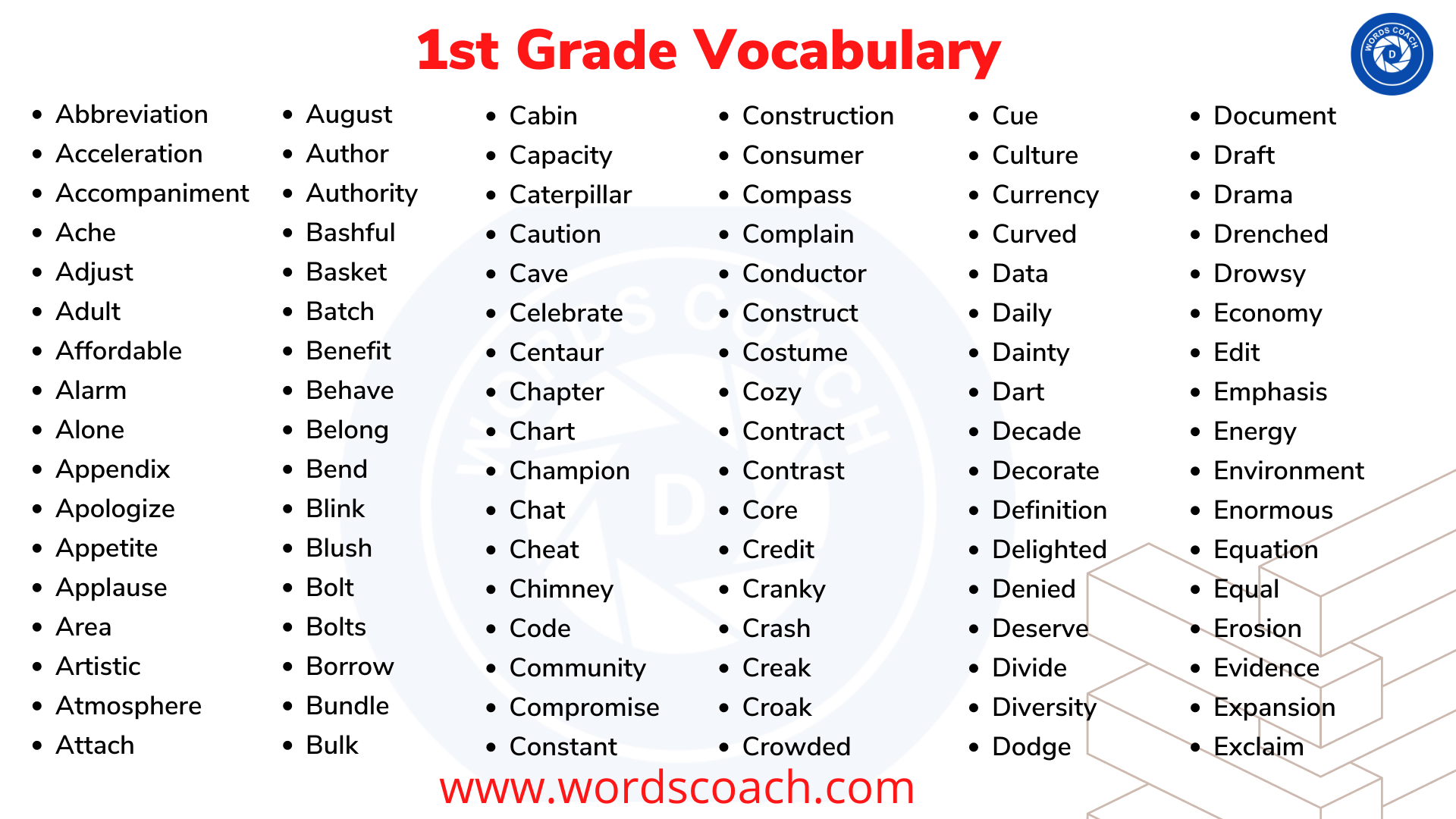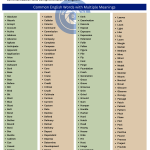6th grade word list
Vocabulary is the key to strong reading, writing, and communication skills. By the time students reach the 6th grade, they begin to encounter more advanced words in their textbooks, literature, and daily conversations. A 6th Grade Word List helps learners expand their vocabulary, improve spelling, and gain confidence in using words correctly.
6th Grade Word List with the meaning
| Word | Meaning |
|---|---|
| Abbreviate | To shorten a word or phrase. |
| Abdicate | To give up a position of power. |
| Abundant | Existing in large quantities. |
| Accommodate | To provide space or adjust for someone. |
| Accumulate | To gather or build up over time. |
| Accurate | Correct in all details; exact. |
| Acquire | To buy or obtain for oneself. |
| Addressed | To deal with or speak to. |
| Adequate | Satisfactory or acceptable in quality or quantity. |
| Adjacent | Next to or adjoining something else. |
| Analyze | To examine something in detail. |
| Anticipate | To expect or predict. |
| Anxious | Experiencing worry or unease. |
| Apparent | Clearly visible or understood; obvious. |
| Appreciate | To recognize the full worth of. |
| Articulate | (v.) To express clearly; (adj.) able to speak fluently. |
| Aspect | A particular part or feature of something. |
| Benevolent | Well-meaning and kindly. |
| Bias | Prejudice in favor of or against one thing. |
| Boycott | To withdraw from commercial or social relations as a punishment. |
| Cause | A person or thing that gives rise to an action. |
| Character | The mental and moral qualities of an individual. |
| Circumference | The distance around a circle. |
| Coherent | Logical and consistent. |
| Compassion | Sympathetic pity and concern for others. |
| Compromise | An agreement where both sides make concessions. |
| Conclude | To bring something to an end. |
| Conflict | A serious disagreement or argument. |
| Congruent | Identical in form; matching. |
| Consequence | A result or effect of an action. |
| Considerable | Notably large in size, amount, or extent. |
| Constant | Occurring continuously over a period of time. |
| Contrast | To compare to show differences. |
| Convey | To transport or communicate. |
| Culture | The customs, arts, and ideas of a society. |
| Debate | A formal discussion on a particular topic. |
| Dedicate | To devote time or effort to a task. |
| Deprive | To deny the possession or use of something. |
| Derive | To obtain something from a source. |
| Describe | To give an account in words. |
| Dialect | A form of a language specific to a region. |
| Dialogue | A conversation between two or more people. |
| Diameter | A straight line passing through the center of a circle. |
| Dilemma | A situation where a difficult choice must be made. |
| Diligent | Having or showing care in one’s work. |
| Diminish | To make or become less. |
| Distinguish | To recognize or treat as different. |
| Effect | A change which is a result of an action. |
| Eliminate | To completely remove or get rid of. |
| Empathy | The ability to understand another’s feelings. |
| Encounter | To unexpectedly meet or face. |
| Energy | The strength required for sustained activity. |
| Enormous | Very large in size or quantity. |
| Envy | A feeling of discontented longing for someone’s advantages. |
| Erode | To gradually wear away. |
| Essential | Absolutely necessary; extremely important. |
| Exaggerate | To represent something as larger or greater than it is. |
| Excerpt | A short extract from a text or film. |
| Exhibit | To publicly display. |
| Expression | The process of making known one’s thoughts. |
| Factor | A circumstance that contributes to a result. |
| Ferocious | Savagely fierce, cruel, or violent. |
| Fluctuate | To rise and fall irregularly. |
| Fortunate | Favored by or involving good luck. |
| Frequency | The rate at which something occurs. |
| Frequent | Occurring or done often. |
| Genre | A category of artistic composition (e.g., mystery, sci-fi). |
| Genius | Exceptional intellectual or creative power. |
| Genocide | The deliberate killing of a large group of people. |
| Gigantic | Of very great size or extent. |
| Gist | The main or general meaning. |
| Habitual | Done constantly or as a habit. |
| Hardship | Severe suffering or privation. |
| Heroic | Having the characteristics of a hero. |
| Hostile | Unfriendly; antagonistic. |
| Hypothesis | A proposed explanation made on the basis of limited evidence. |
| Identity | Who or what a person or thing is. |
| Illegible | Not clear enough to be read. |
| Immense | Extremely large or great. |
| Imply | To suggest something without stating it directly. |
| Infer | To deduce or conclude from evidence. |
| Influence | The capacity to have an effect on someone. |
| Inform | To give facts or information. |
| Innovate | To make changes in something established. |
| Interpret | To explain the meaning of. |
| Justify | To show or prove to be right or reasonable. |
| Literal | Taking words in their usual or most basic sense. |
| Luxury | A state of great comfort and extravagant living. |
| Majority | The greater number or part. |
| Minority | The smaller number or part. |
| Misery | A state of great distress or discomfort. |
| Misfortune | Bad luck. |
| Morality | Principles concerning right and wrong behavior. |
| Mythology | A collection of myths, especially from a culture. |
| Narrative | A spoken or written account of connected events. |
| Narrator | A person who tells a story. |
| Navigate | To plan and direct a route. |
| Negotiate | To try to reach an agreement. |
| Numerous | Great in number; many. |
| Objective | (n.) A goal; (adj.) not influenced by personal feelings. |
| Obsolete | No longer produced or used; outdated. |
| Obstacle | A thing that blocks one’s way. |
| Oppose | To be against something. |
| Origin | The point where something begins. |
| Originate | To have a specified beginning. |
| Paraphrase | To express the meaning using different words. |
| Peculiar | Strange or odd; unusual. |
| Persecute | To subject to hostility and ill-treatment. |
| Persevere | To continue in a course of action despite difficulty. |
| Perspective | A particular attitude or way of viewing things. |
| Persuade | To cause someone to believe something. |
| Plagiarism | The practice of taking someone’s work and passing it off as one’s own. |
| Plentiful | Existing in great quantity. |
| Population | All the inhabitants of a place. |
| Portray | To depict or describe in a certain way. |
| Precede | To come before something in time. |
| Prediction | A statement about what will happen in the future. |
| Prefix | A word part added to the beginning of a root word. |
| Presume | To suppose that something is true. |
| Proceed | To begin or continue a course of action. |
| Prologue | A separate introductory section of a literary work. |
| Prominent | Important; famous. |
| Prose | Written or spoken language in its ordinary form (not poetry). |
| Protagonist | The main character in a story. |
| Provide | To make available for use; to supply. |
| Provoke | To stimulate or give rise to a reaction. |
| Pursue | To follow or chase. |
| Quench | To satisfy one’s thirst; to extinguish a fire. |
| Radius | A straight line from the center to the circumference of a circle. |
| Reasonable | Fair and sensible. |
| Rejection | The dismissing or refusing of a proposal. |
| Reluctant | Unwilling and hesitant. |
| Require | To need for a particular purpose. |
| Resolve | To settle or find a solution to a problem. |
| Response | A verbal or written answer. |
| Restate | To state again or differently. |
| Restore | To bring back to a previous condition. |
| Revise | To re-examine and make alterations to. |
| Revolution | A forcible overthrow of a government; a dramatic change. |
| Rural | Relating to the countryside. |
| Scarce | Insufficient for the demand. |
| Significant | Sufficiently great or important to be worthy of attention. |
| Similar | Resembling without being identical. |
| Simile | A figure of speech comparing two things using “like” or “as.” |
| Solution | A means of solving a problem. |
| Source | A place, person, or thing from which something originates. |
| Summarize | To give a brief statement of the main points. |
| Superior | Higher in quality, status, or power. |
| Suspense | A state of excited uncertainty about what may happen. |
| Symbol | A thing that represents or stands for something else. |
| Tension | Mental or emotional strain. |
| Thesis | A statement or theory that is put forward as a premise. |
| Tone | The general character or attitude of a piece of writing. |
| Tradition | A long-established custom or belief. |
| Trait | A distinguishing quality or characteristic. |
| Transform | To make a thorough or dramatic change. |
| Transition | The process of changing from one state to another. |
| Unique | Being the only one of its kind. |
| Universal | Applicable to all cases. |
| Universe | All existing matter and space. |
| Urban | Relating to a city or town. |
| Utilize | To make practical and effective use of. |
| Vary | To differ in size, amount, or degree. |
| Vast | Of very great extent or size. |
| Verbal | Relating to or in the form of words. |
| Verify | To make sure or demonstrate that something is true. |
| Vibrant | Full of energy and enthusiasm. |
| Violate | To break or fail to comply with a rule. |
| Virtual | Almost or nearly as described, but not completely. |
| Vision | The ability to think about the future with imagination. |
| Visual | Relating to seeing or sight. |
| Volume | The amount of space a substance occupies. |
| Widespread | Found or distributed over a large area. |
Building a strong vocabulary in 6th grade lays the foundation for success in higher grades and beyond. With practice, students can master these words and use them in daily life confidently.
Want to Learn More?
| 5th Grade Word List | 4th Grade Word List | 3rd Grade Vocabulary List |
| C2 Vocabulary Exercise | The Most Overused Words in English | Nouns and Verbs Quiz With Answers |
Download Word Coach Application






